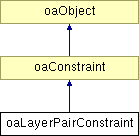 |
 |
 |
||||||
Inheritance diagram for oaLayerPairConstraint:

 |
 |
Public Methods | |
| oaLayerNum | getLayer1 () const |
| oaLayerNum | getLayer2 () const |
| oaPurposeNum | getPurpose1 () const |
| oaPurposeNum | getPurpose2 () const |
Static Public Methods | |
| oaLayerPairConstraint * | create (oaLayerNum layer1, oaLayerNum layer2, const oaLayerPairConstraintDef *def, oaValue *value, oaBoolean isHard=true, const oaConstraintParamArray *params=NULL) |
| oaLayerPairConstraint * | create (oaLayerNum layer1, oaLayerNum layer2, const oaLayerPairConstraintDef *def, const oaString &name, oaValue *value, oaBoolean isHard=true, const oaConstraintParamArray *params=NULL) |
| oaLayerPairConstraint * | create (oaLayerNum layer1, oaPurposeNum purpose1, oaLayerNum layer2, oaPurposeNum purpose2, const oaLayerPairConstraintDef *def, oaValue *value, oaBoolean isHard=true, const oaConstraintParamArray *params=NULL) |
| oaLayerPairConstraint * | create (oaLayerNum layer1, oaPurposeNum purpose1, oaLayerNum layer2, oaPurposeNum purpose2, const oaLayerPairConstraintDef *def, const oaString &name, oaValue *value, oaBoolean isHard=true, const oaConstraintParamArray *params=NULL) |
| oaLayerPairConstraint * | find (const oaConstraintGroup *group, oaLayerNum layer1, oaLayerNum layer2, const oaLayerPairConstraintDef *def, oaBoolean hardOnly=false) |
| oaLayerPairConstraint * | find (const oaConstraintGroup *group, oaLayerNum layer1, oaPurposeNum purpose1, oaLayerNum layer2, oaPurposeNum purpose2, const oaLayerPairConstraintDef *def, oaBoolean hardOnly=false) |
| oaCollection< oaLayerPairConstraint, oaConstraintGroup > | getConstraints (const oaConstraintGroup *group, oaLayerNum layer1, oaLayerNum layer2, const oaLayerPairConstraintDef *def=NULL) |
If a purpose is specified corresponding to one or both of the layers associated with the oaLayerPairConstraint, the constraint applies only between shapes on those layers with the specified purpose or purposes.
|
||||||||||||||||||||||||||||||||||||||||
|
This function creates an explicitly named constraint with the specified attributes. The new layer pair constraint is created with the specified purposes in the same database as the value specified.
|
|
||||||||||||||||||||||||||||||||||||
|
This function creates an auto-named constraint with the specified attributes. The new layer pair constraint is created with the specified layer purposes in the same database as the value specified.
|
|
||||||||||||||||||||||||||||||||
|
This function creates an explicitly name constraint with the specified attributes. The constraint is created in the same database as the value. The constraint parameters must also exist in the same database as the value.
|
|
||||||||||||||||||||||||||||
|
This function creates an auto-named constraint with the specified attributes. The constraint is created in the same database as the value. The constraint parameters must also exist in the same database as the value.
|
|
||||||||||||||||||||||||||||||||
|
This function returns the first constraint in this group that matches the definition, layers, purposes, and hardOnly attributes specified. If no such constraint is found NULL is returned. If the purpose number is oavPurposeNumberAny, the returned constraint can have any purpose for the layer. If the purpose number is oavPurposeNumberNo, the returned constraint must have no purpose specified for the layer.
|
|
||||||||||||||||||||||||
|
This function returns the first hard or soft constraint in this group that matches the definition, and layers specified. If no such constraint is found NULL is returned.
|
|
||||||||||||||||||||
|
This function returns a collection of layer pair constraints in the specified group whose definition matches the one given. If no definition is specified, all layer constraints on that layer in that group are returned.
|
|
|
This function returns the first layer associated with this constraint. |
|
|
This function returns the second layer associated with this constraint. |
|
|
This function returns the purpose number associated with the first layer of the pair for this constraint. |
|
|
This function returns the purpose number associated with the second layer of the pair for this constraint. |

Copyright © 2002 - 2010 Cadence Design Systems, Inc.
All Rights Reserved.